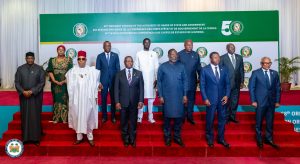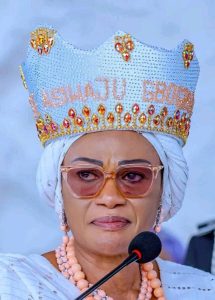Abuja, 12 June 2025 – President Bola Ahmed Tinubu’s address to the Nigerian National Assembly on Democracy Day, marking 26 years of uninterrupted democratic rule, was a grand exercise in rhetoric but a glaring missed opportunity to confront the nation’s mounting crises. Delivered with the pomp of a statesman, the speech was laden with platitudes, selective historical revisionism, and promises that ring hollow against the backdrop of Nigeria’s economic hardship, insecurity, and eroding public trust. While Tinubu sought to celebrate the resilience of Nigerian democracy, his address sidestepped the urgent realities facing ordinary citizens, exposing a disconnect between the presidency and the people it claims to serve.
Tinubu’s speech leaned heavily on the legacy of June 12, invoking the sacrifices of pro-democracy heroes like Chief MKO Abiola, Kudirat Abiola, and others who fought against military rule. The conferment of posthumous national honours, including the CFR on Kudirat Abiola and others, was a commendable gesture, as was the pardon for Ken Saro-Wiwa and the Ogoni Nine. However, these symbolic acts, while emotionally resonant, do little to address the immediate concerns of Nigerians grappling with soaring inflation, unemployment, and insecurity. The president’s focus on historical tributes felt like an attempt to bask in the glory of past struggles rather than a commitment to tackling present-day challenges.
The speech’s tone was one of self-congratulation, with Tinubu touting economic reforms that have allegedly yielded a 3.4% GDP growth in 2024 and a stabilised Naira. Yet, these claims are jarring when juxtaposed against the lived experiences of millions. Inflation, though reportedly easing, continues to erode purchasing power, with staple foods like rice and beans remaining unaffordable for many. The much-vaunted consumer credit scheme, benefiting 100,000 Nigerians, pales in comparison to the scale of poverty affecting over 80 million citizens. Tinubu’s assertion that states no longer borrow to pay salaries ignores the reality of unpaid workers and pensioners in several regions, painting an overly rosy picture that insults the intelligence of the masses.
Tinubu’s dismissal of rumours about an APC-led one-party state was a curious inclusion, dedicating significant airtime to a strawman argument. His insistence that he welcomes political diversity was undermined by his gleeful tone when describing opposition parties in “disarray” and his warm welcome to defectors from Delta and Akwa Ibom. This thinly veiled gloating betrays a leader more concerned with consolidating power than fostering genuine democratic pluralism. His claim to have stood as the “last progressive governor” in 2003 reeks of self-aggrandisement, conveniently glossing over the complexities of that era’s political manoeuvring.
Moreover, Tinubu’s call for legislative cooperation across party lines, while noble in theory, lacks credibility given his administration’s history of strong-arming opposition voices. The speech’s plea for tolerance of “harsh words” and criticism is ironic, considering the clampdowns on protests and dissent under his watch. Nigerians recall the heavy-handed response to the 2024 #EndBadGovernance protests, where security forces were accused of excessive force. For a president to preach free speech while his government stifles it is, at best, hypocritical.
The president’s economic vision, anchored on tax reforms, fibre optic expansion, and youth empowerment schemes like NELFUND, sounds ambitious but lacks a clear roadmap. The promise of a 7% GDP growth target and food sovereignty is aspirational, yet the speech offered no concrete strategies to address the structural barriers—such as unreliable power, corruption, and bureaucratic inefficiencies—that have long plagued Nigeria’s economy. The fibre optic project, while forward-thinking, feels like a luxury when basic infrastructure like roads and electricity remains woefully inadequate.
Tinubu’s praise for the National Credit Guarantee Company and consumer credit initiatives ignores their limited reach. With only 35,000 civil servants benefiting from CREDICORP, the scheme is a drop in the ocean for a population of over 200 million. The promise to extend credit to 400,000 youths in July is vague, with no details on eligibility or sustainability. Such initiatives risk becoming populist gimmicks if not backed by transparent implementation and accountability.
Perhaps the most egregious flaw in Tinubu’s address was its superficial treatment of Nigeria’s security crisis. The president’s brief mention of intensified security operations and improved inter-agency coordination was woefully inadequate for a nation plagued by banditry, terrorism, and communal violence. His claim that highways are safer is laughable to citizens who avoid major roads for fear of kidnapping. The tribute to the armed forces, while deserved, felt like a perfunctory nod rather than a substantive commitment to addressing the systemic issues undermining national security, such as underfunded troops and outdated equipment.
Tinubu’s speech concluded with a call to rededicate Nigeria to the ideals of June 12—freedom, social justice, and accountable governance. Yet, these ideals remain elusive under his administration. The president’s failure to acknowledge the widespread disillusionment with his reforms, coupled with his dismissive tone towards critics, suggests a leader out of touch with the pulse of the nation. Nigerians are not seeking grandiose speeches or posthumous honours; they demand tangible improvements in their quality of life.
As Nigeria stands at an “inflection point,” as Tinubu aptly noted, the need for bold, empathetic leadership has never been greater. This Democracy Day address was a chance to rally a weary nation, to offer a clear vision for the future, and to bridge the chasm between the government and its people. Instead, it was a masterclass in political theatre—long on rhetoric, short on solutions, and deaf to the cries of a struggling populace. If Tinubu is to honour the legacy of June 12, he must move beyond words and deliver the democratic dividends Nigerians so desperately deserve.
Subscribe to our newsletter!






